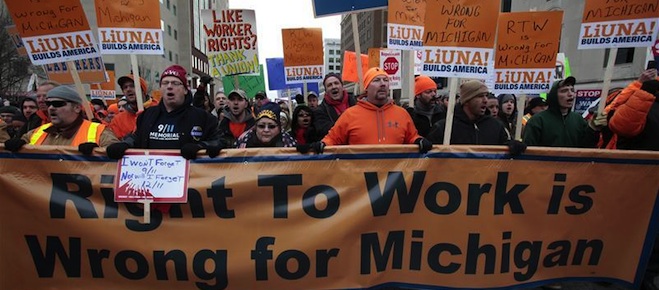Republicans hit unions where it hurts
Right-to-work laws target the same labour unions that helped fund Obama’s victory
Rebecca Cook/Reuters
Share

As Republicans try to rebuild after November’s electoral defeat, one of their priorities for 2013 may be going after the sources of the Democrats’ power—and no target is easier, or more inviting, than labour unions. The first post-election salvo against unions came in Michigan, home to thousands of unionized auto workers. By signing a right-to-work law outlawing requirements that workers pay union fees to work, Republican Gov. Rick Snyder may have inspired other Republican-controlled states. Groups like the pro-business American Legislative Exchange Council (ALEC), which provided the template for Michigan’s law, are already hoping to take the fight to other blue states in 2013.
Weakening unions has been a traditional Republican priority, from 1947’s Taft-Hartley Act that restricted union power, to former president Ronald Reagan’s famous fight with the air-traffic controllers’ union in 1981. But in past decades, there was a countervailing pro-union wing of the party, consisting of moderate northeastern Republicans. Now most are gone, and the party stars tend to align with South Carolina Gov. Nikki Haley, who once declared: “I love that we are one of the least unionized states in the country.”
Beyond party ideology, taking on unions has a clear political advantage: right-to-work laws cut off an outside source of funding for the Democratic party—funding that helped drive the get-out-the-vote operations which propelled President Barack Obama to victory in most swing states. But by reducing the amount of money unions can collect by an estimated 20 to 30 per cent, the new Michigan law might make it harder for future Democratic presidential candidates to win the state.
Of course, there are political risks: Mitt Romney’s stance against Obama’s auto bailout may have cost him labour-friendly states like Ohio and Michigan. And while groups like ALEC are already eyeing Republican-controlled Pennsylvania as a possible new right-to-work state, Gov. Tom Corbett says “there is not much of a movement to do it.” Then again, movements can start pretty quickly: Snyder once called such laws “divisive,” and said they were “not on my agenda,” only to change his mind this year. It remains to be seen whether other governors will, too.